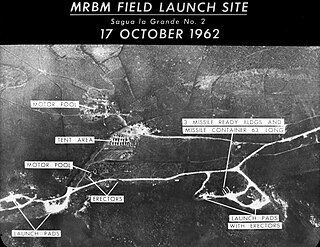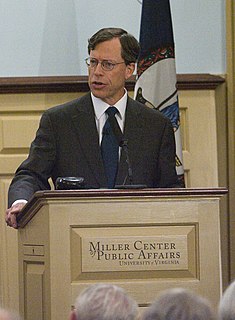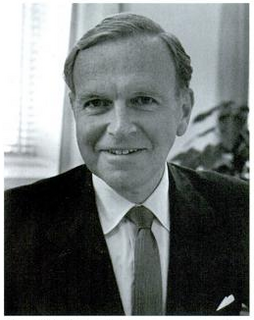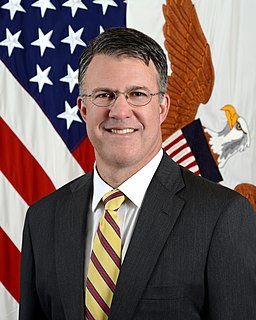
The Cuban Missile Crisis, also known as the October Crisis of 1962, the Caribbean Crisis, or the Missile Scare, was a 13-day confrontation between the United States and the Soviet Union initiated by Soviet ballistic missile deployment in Cuba. The confrontation is often considered the closest the Cold War came to escalating into a full-scale nuclear war.

In nuclear strategy, a first strike is a preemptive surprise attack employing overwhelming force. First strike capability is a country's ability to defeat another nuclear power by destroying its arsenal to the point where the attacking country can survive the weakened retaliation while the opposing side is left unable to continue war. The preferred methodology is to attack the opponent's strategic nuclear weapon facilities, command and control sites, and storage depots first. The strategy is called counterforce.

World War III and the Third World War are names given to a hypothetical third worldwide large-scale military conflict subsequent to World War I and II. The term has been in use since at least as early as 1941. Some have applied it loosely to refer to limited or smaller conflicts such as the Cold War or the War on Terror, while others assumed that such a conflict would surpass prior world wars both in its scope and in its destructive impact.

Nuclear terrorism refers to any person or persons who detonate a nuclear weapon as an act of terrorism. Some definitions of nuclear terrorism include the sabotage of a nuclear facility and/or the detonation of a radiological device, colloquially termed a dirty bomb, but consensus is lacking. In legal terms, nuclear terrorism is an offense committed if a person unlawfully and intentionally "uses in any way radioactive material … with the intent to cause death or serious bodily injury; or with the intent to cause substantial damage to property or to the environment; or with the intent to compel a natural or legal person, an international organization or a State to do or refrain from doing an act", according to the 2005 United Nations International Convention for the Suppression of Acts of Nuclear Terrorism.

Brinkmanship is the practice of trying to achieve an advantageous outcome by pushing dangerous events to the brink of active conflict. It occurs in international politics, foreign policy, labor relations, and military strategy involving the threat of nuclear weapons, and high-stakes litigation. This maneuver of pushing a situation with the opponent to the brink succeeds by forcing the opponent to back down and make concessions. This might be achieved through diplomatic maneuvers by creating the impression that one is willing to use extreme methods rather than concede. The term is chiefly associated with American Secretary of State John Dulles, during the early years of the Eisenhower administration 1953-1956. Dulles sought to deter aggression by the Soviet Union by warning that the cost might be massive retaliation against Soviet targets.

Philip David Zelikow is an American attorney, diplomat, academic and author. He has worked as the executive director of the 9/11 Commission, director of the Miller Center of Public Affairs at the University of Virginia, and Counselor of the United States Department of State. He is the White Burkett Miller Professor of History at the University of Virginia and was American Academy in Berlin Axel Springer Fellow, in the fall of 2009.

Joseph Samuel Nye Jr. is an American political scientist. He is the co-founder, along with Robert Keohane, of the international relations theory of neoliberalism, developed in their 1977 book Power and Interdependence. Together with Keohane, he developed the concepts of asymmetrical and complex interdependence. They also explored transnational relations and world politics in an edited volume in the 1970s. More recently, he explained the distinction between hard power and soft power, and pioneered the theory of soft power. His notion of "smart power" became popular with the use of this phrase by members of the Clinton Administration, and more recently the Obama Administration. He is the former Dean of the John F. Kennedy School of Government at Harvard University, where he currently holds the position of University Distinguished Service Professor, Emeritus. In October 2014, Secretary of State John Kerry appointed Nye to the Foreign Affairs Policy Board. He is also a member of the Defense Policy Board.

Ashton Baldwin Carter is an American public policy professor who served as the 25th secretary of defense from February 2015 to January 2017. He is currently Director of the Belfer Center for Science & International Affairs at Harvard Kennedy School.
Essence of Decision: Explaining the Cuban Missile Crisis is an analysis by political scientist Graham T. Allison, of the 1962 Cuban Missile Crisis. Allison used the crisis as a case study for future studies into governmental decision-making. The book became the founding study of the John F. Kennedy School of Government, and in doing so revolutionized the field of international relations.

R. Nicholas Burns is a university professor, columnist, lecturer and former American diplomat. He is currently Professor of the Practice of Diplomacy and International Politics at Harvard's John F. Kennedy School of Government and a member of the Board of Directors of the school's Belfer Center for Science and International Affairs. At the Harvard Kennedy School, he is director of The Future of Diplomacy Project and Faculty Chair for the programs on the Middle East and India and South Asia. He is Director of the Aspen Strategy Group, senior counselor at The Cohen Group and serves on the Board of Directors of Entegris, Inc. He writes a bi-weekly column on foreign affairs for The Boston Globe and is a senior foreign affairs columnist for GlobalPost. He also serves on the Board of Directors of the Atlantic Council, the Council on Foreign Relations, Special Olympics, the Rockefeller Brothers Fund, the Appeal of Conscience Foundation, the Center for the Study of the Presidency and Congress, American Media Abroad, the Gennadius Library and the Richard Lounsbery Foundation. Burns was in 2020 a Fulbright scholar at Queen Mary University of London and contributor to the New Statesman.

Roswell Leavitt Gilpatric was a New York City corporate attorney and government official who served as Deputy Secretary of Defense from 1961–64, when he played a pivotal role in the high-stake strategies of the Cuban Missile Crisis, advising President John F. Kennedy as well as Robert McNamara and McGeorge Bundy on dealing with the Soviet nuclear missile threat. Gilpatric later served as Chairman of the Task Force on Nuclear Proliferation in 1964.

Llewellyn E. "Tommy" Thompson Jr. was a United States diplomat. He served in Sri Lanka, Austria, and, for a lengthy period, in the Soviet Union where his tenure saw some of the most significant events of the Cold War. He was a key advisor to President John F. Kennedy during the Cuban Missile Crisis. A 2019 assessment described him as " arguably the most influential figure who ever advised U.S. presidents about policy toward the Soviet Union during the Cold War."

The Executive Committee of the National Security Council was a body of United States government officials that convened to advise President John F. Kennedy during the Cuban Missile Crisis in 1962. It was composed of the regular members of the National Security Council, along with other men whose advice the President deemed useful during the crisis. EXCOMM was formally established by National Security Action Memorandum 196 on October 22, 1962. It was made up of twelve full members in addition to the president. Advisers frequently sat in on the meetings, which were held in the Cabinet Room of the White House's West Wing and secretly recorded by tape machines activated by Kennedy. None of the other committee members knew the meetings were being recorded, save probably the president's brother, Attorney General Robert F. Kennedy.

Meghan L. O'Sullivan is a former deputy national security adviser on Iraq and Afghanistan. She is Jeane Kirkpatrick Professor of the Practice of International Affairs at Harvard Kennedy School and a board member of the Belfer Center for Science and International Affairs at Kennedy School. She is a member of the board of directors of the Council on Foreign Relations, where she was previously an adjunct senior fellow, and the North American chair of the Trilateral Commission.

Richard Weitz is a Senior Fellow and Director of the Center for Political-Military Analysis at Hudson Institute and an Expert at Wikistrat. His parents are Morris Weitz and Margaret Weitz, both notable academics.
Richard A. Falkenrath Jr. served as Deputy Commissioner of Counter-Terrorism of the New York City Police Department from 2006 to 2010. He was the third person to hold this position. His predecessors were Frank Libutti and Michael Sheehan.
The William and Katherine Estes Award, previously known as the NAS Award for Behavioral Research Relevant to the Prevention of Nuclear War is awarded by the U.S. National Academy of Sciences "to recognize basic research in any field of cognitive or behavioral science that has employed rigorous formal or empirical methods, optimally a combination of these, to advance our understanding of problems or issues relating to the risk of nuclear war". It was first awarded in 1990.
The Thucydides Trap, or Thucydides's Trap, is a term coined by American political scientist Graham T. Allison to describe an apparent tendency towards war when an emerging power threatens to displace a preexisting great power as the international hegemon. It was coined and is primarily used to describe a potential conflict between The United States and The People's Republic of China.
Matthew Bunn is an American nuclear and energy policy analyst, currently a professor of practice at the Harvard Kennedy School at Harvard University. He is the Co-principal Investigator for the Belfer Center's Project on Managing the Atom.

Eric Brien Rosenbach is an American public servant and retired U.S. Army Captain who served as Pentagon Chief of Staff from July 2015 to January 2017 and as Assistant Secretary of Defense for Homeland Defense and Global Security from September 2014 to September 2015. As Chief of Staff, Rosenbach assisted Secretary Ash Carter on the Department of Defense's major challenges of the time, which included increased Russian aggression, the Syrian Civil War, and North Korean missile tests.














